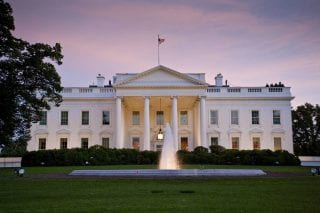 Noah Pittman is the instructor for this fall’s Honors College Forum: Campaign 2020. Noah serves as the associate dean of enrollment for the University of Arkansas Honors College. His doctorate is in public policy, with a focus on higher education policy. He’s married to his beautiful wife, Pamela, and they have two small children, Bennett, an energetic 5 year old who can correctly identify just about any dinosaur imaginable, and Ella, a precocious 2 year old who will likely run the world one day. If you’re interested in tweets on politics, American higher education, or the occasional rant about the Atlanta Braves or the Memphis Grizzlies, you can follow him on Twitter, @NoahPittman.
Noah Pittman is the instructor for this fall’s Honors College Forum: Campaign 2020. Noah serves as the associate dean of enrollment for the University of Arkansas Honors College. His doctorate is in public policy, with a focus on higher education policy. He’s married to his beautiful wife, Pamela, and they have two small children, Bennett, an energetic 5 year old who can correctly identify just about any dinosaur imaginable, and Ella, a precocious 2 year old who will likely run the world one day. If you’re interested in tweets on politics, American higher education, or the occasional rant about the Atlanta Braves or the Memphis Grizzlies, you can follow him on Twitter, @NoahPittman.
It’s been an interesting year, huh? In the midst of a pandemic and one of the most contentious presidential races in recent history, 17 honors students have been meeting weekly either in our Gearhart Hall lounge/converted classroom or over Zoom to discuss the twists and turns of this year’s election season. There has been an immense amount of material to cover, but these brilliant students are some of the best political minds you will find in the state of Arkansas.
The students have had an incredibly busy semester. We started the fall with assignments where they had to interview an individual who voted for President Trump in 2016 along with a second interview with someone who voted for Secretary Clinton. These interviews were done with the intention of helping students understand the reasoning behind an individual’s propensity to support (or oppose) President Trump. Students were also assigned a competitive U.S. Senate or House race to track throughout the semester, culminating in a pre-election post. In the posts to come, you will get to see the analysis each student has prepared for a competitive or lean state in this year’s Electoral College, with a prediction on the final vote tally. That said, here are some quick notes about these predictions and what we recommend you watch for on Election Night.
When will we know? With the unprecedented number of mail-in ballots being cast this year, when will we have a clear idea of who will be the next President? In some states, such as Florida, Ohio, and North Carolina, we should get a fairly clear picture on Election Night, since each state plans to start counting mail-in ballots prior to Election Day. In other competitive states, including Pennsylvania, Michigan, and Wisconsin, it will be more difficult to initially predict a winner due to the fact that each state will not start counting mail-in ballots before Election Day. Unless a candidate has a clear victory in the Electoral College without definitive results from those three states, it will likely take a day or two before a national winner is declared.
Will we see polling error on par with 2016? At least according to the polls, it is no secret that Vice President Biden is the favorite to win this election. As of November 2, FiveThirtyEight gives Biden a 90% chance of winning the Electoral College (compared to around 70% for Clinton in 2016) and a 97% chance of winning the popular vote. Everyone has read about how the reasons a number of polls—especially state polls—were off in 2016. In order to win reelection, President Trump has to hope for an even more significant polling error in 2020 that tilts in his direction.
Are we seeing the beginning of political realignment in Georgia and Texas? With growing urbanization and significant demographic shifts, two previously reliable red states in Georgia and Texas are becoming more purple each cycle. Current polling shows Vice President Biden within striking distance of winning each state. This may or may not be the year we see Georgia or Texas go blue, but there is certainly a trend toward each state becoming legitimate battlegrounds each cycle by the end of this decade.
What about Congress? Aside from a few competitive House races, don’t expect much drama in the battle for control. Democrats are the overwhelming favorites to maintain their House majority and are even expected to gain anywhere from 5-20 seats. The Senate, on the other hand, is far more competitive. RCP currently has nine toss-up Senate races that will likely determine control. On Election Night, keep a close eye on competitive races in Arizona, Georgia, Iowa, Maine, Michigan, and North Carolina, along with possibly Minnesota and South Carolina. Remember, whichever party wins the White House will only need 50 seats to claim a majority, with the Vice President serving as the tiebreaker vote. Also, with runoffs expected in two Georgia U.S. Senate races, we may not know who will hold a Senate majority for a couple of months.
Now, enjoy the blog posts from our honors students!
